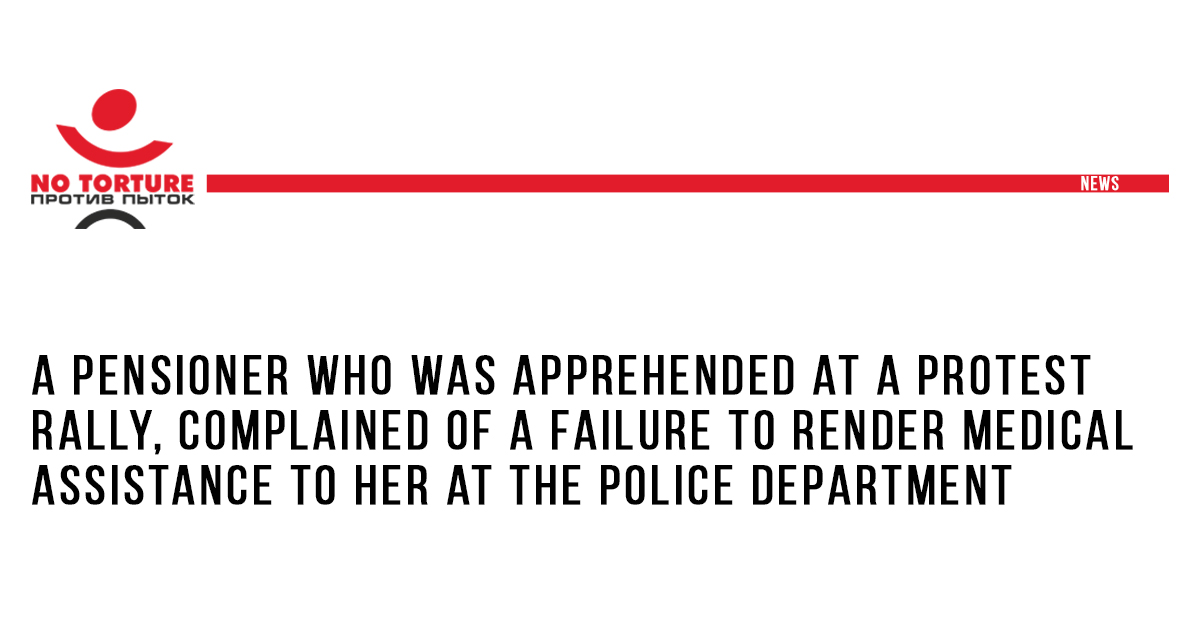A pensioner from Nizhny Novgorod, Lyudmila Polyakova, who has a third degree of disability, claims that the police officers were keeping her at the police department for over six hours and refused to call an ambulance despite her problems with heart and high blood pressure. She was detained by the police officers during the protest rally on 31 January of this year and taken to the police department where she felt bad. Based on the fact of the incident, lawyers with the Committee Against Torture applied to the Investigative Committee on behalf of Lyudmila with a crime report.
On 23 March 2021, 62-year old Lyudmila Polyakova from Nizhny Novgorod applied to the Committee Against Torture for legal assistance. She told human rights defenders that on 31 January of this year she was detained by law-enforcement officers during the protest rally and put into a police van.
Together with other apprehended, Lyudmila was taken to Police Department No.2 of Nizhny Novgorod, where her condition deteriorated.
At the police department, a protocol on administrative violation was drawn up on Lyudmila under part 6.1 of Article 20.2 of the Administrative Offences Code of the Russian Federation (“participation in unsanctioned gathering, rally, demonstration, march or picket, which created obstacles to functioning of life-support facilities, transport or social infrastructure”) only two hours after the apprehension, and, according to Polyakova, the police officers refused to include there the information that she was a disabled of third category. Subsequently, the court requalified the offence to Part 5 of Article 20.2 of the Administrative Offences Code of the Russian Federation (“violation of the established order by a participant of the public event”) and set a fine of five thousand rubles for Lyudmila.
“At that moment I felt worse. I developed a stenocardia, which is a compressing pain in the chest, as well as giddiness”, – Lyudmila tells.
Then, according to Polyakova, she was taken to the assembly hall where there were several dozens of other detained. Sometime later she informed that she felt bad and asked to call an ambulance for her, however, the police officer did not do it, according to the pensioner.
Only quite a long time after that, according to Lyudmila, she managed to see the medical ambulance doctors who came to another detained.
“The doctor said that I had a very high blood pressure, but no infarct, – Polyakova recalls. – He also said that I needed rest immediately and I could not be at the police department”.
According to Polyakova, the doctor informed the police officers about it, however, she was not released from the police department, but taken back to the other detained at the assembly hall, and there she started to ask the police officers to call a medical team for her, but to no avail.
“The police officer said that if I was not hospitalized, they would not release me, – Lyudmila explained. – At that moment, I felt really bad, I was really worried I could die”.
Lyudmila was released from the police only by about seven in the evening, and she felt very bad. Near the entrance, she was met by members of the Public Monitoring Committee of the Nizhny Novgorod region, who could not get inside due to the activation of “Fortress” plan.
On the same day, Polyakova applied to the Nizhny Novgorod Regional Clinical Hospital named after Semashko, where she was diagnosed with a hypertensic crisis.
Yesterday, on 19 April, human rights defenders applied to the Investigative Committee on behalf of Lyudmila Polyakova with a crime report based on the fact of the incident.
“According to the practice of the European Court of Human Rights, which is a part of the Russian legal system, brutal treatment is not necessarily always connected to direct use of violence by the authority representatives. The degree of brutality may be defined also based on personal peculiarities of the victim, for example, age or state of health. For over six hours the police officers were keeping Lyudmila at the police department and refused to call for an ambulance, despite the fact that she was feeling worse and worse. I’m convinced that the Investigative Committee should examine the police officers’ actions based on the criminal law and provide their evaluation,” – lawyer with the Committee Against Torture Vladimir Smirnov comments.
As we have previously reported, in spring of 2020, in similar circumstances, the European Court of Human Rights declared Russia guilty of brutal treatment of other pensioner, Liliya Gremina. That situation took place back in 2007: the pensioner was detained during the “March of the Discontented” and taken to the police department of the Avtozavodsky District, where he also had a hypertonic crisis, but she received no appropriate medical assistance. The Strasbourg judges awarded Gremina a compensation of 5000 Euro.
